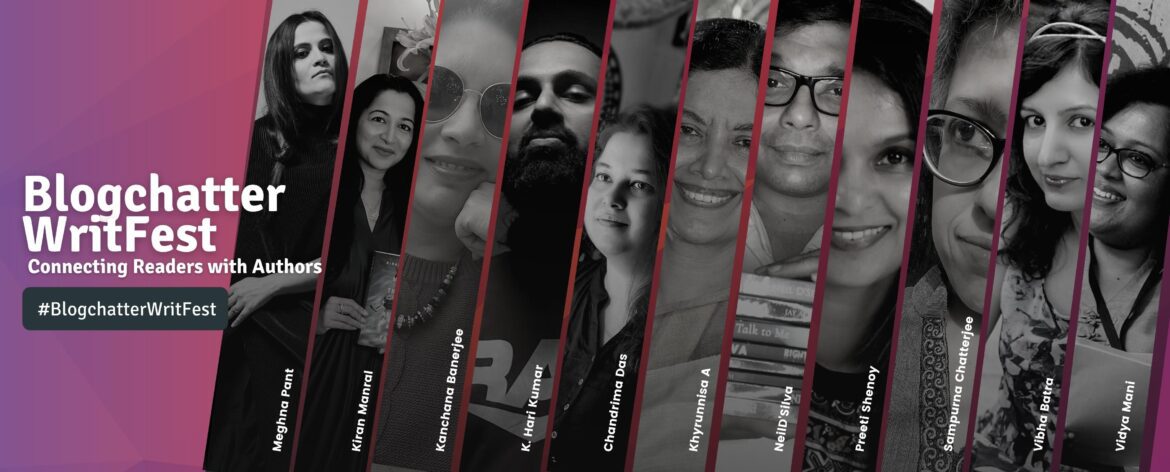BlogchatterWritFest is Blogchatter’s campaign for March, a wonderful initiative that brings readers closer to the authors.
This is the line-up of the interesting sessions.
- Mar 4 Relatability In Fiction with Meghana Pant, Kiran Manral and Kanchana Banerjee
- Mar 7 Writing Engaging Stories by Preeti Shenoy.
- Mar 11 Thrilling your Reader by K Hari Kumar, Chandrima Das, and Neil D’Silva.
- Mar 21 Getting Started with Poetry with Sampurna Chattarjee.
- Mar 25 Writing Books that Children Enjoy by Vibha Batra, Akhyrunissa, and Vidya Mani
I enjoy reading poems but struggle to write heart-touching poems. So, when Blogchatter announced the event deets on Twitter, I signed up for the session immediately. I found Getting Started with Poetry with Sampurna Chatterjee held on 21st March 2022 extremely useful and engaging.
SAMPURNA CHATTARJI is a poet, novelist, and translator with fourteen books to her credit. Born in Ethiopia in November 1970, Sampurna grew up in Darjeeling, graduated from New Delhi, and is now based in Mumbai/Thane. Her debut poetry collection, Sight May Strike You Blind, published by the Sahitya Akademi (Indian Academy of Letters) in 2007, was reprinted in 2008. Sampurna’s poetry has appeared in various Indian and international journals.
The poet answered various questions revolving around the different aspects of writing poetry. Here’s a quick summary of the session:
Q. What is the purpose of poetry?
According to Sampurna Chatterjee, poetry is a way of surviving internal and external obstacles. She said writing poems comes naturally to her in times of crisis, and anarchy brings out a poet’s voice.
- Poetry is not static, rather, it is a path that takes us somewhere we may not go otherwise.
- It is the poet’s responsibility to be the mouth that speaks the truth and refuses to be a mouthpiece.
It is an endangered, yet essential art form.
Q. What are the basics of writing poetry?
- It should be a spontaneous flow of emotions. Poetry is a fusion of spontaneity and programming. The format helps the poet move ahead with their thoughts and feelings.
- In short, feelings + making are equally important.
She also emphasized the importance of learning the craft. One should know the nuts and bolts of the language and have a love for both the language and the craft. She advised to write in the language one is most comfortable with, and reading more poems in the format and style one wants to explore.
According to her, there is no shortcut to writing poems, but the following is a mantra that would help all poets-
- To not fear writing and re-writing
- To take criticism in one’s stride and apply it for the betterment.
- With time, one should be able to edit their work.
- Patience and resistance make a lot of difference.
Q. What are the various forms of poetry?
Chatterjee advised poets to visit the website of Poetry Foundation to get more details regarding it as it is a good resource for detailed and precise forms of poetry. Prose poem and non-sequential, non-narrative are the poet’s personal favourites.
Q. Can we combine various forms of poems in a book?
Chatterjee said a poet can do it if they are aware of the inner logic behind the same.
Q. How much can a beginner experiment with trends?
Chatterjee believes poets should know the “trends,” but should not be afraid of plunging into the deep end. She advised poets to experiment with language, forms.
I’ll never forget her advice-
“Make the path difficult. Hold someone’s hand and dive in rather than staying at the shallow end. Experiment as much as you want, but be clear basics. Be prepared to fail.”
Q What is your advice on translating poems?
Chattarjee emphasized it is imperative to know both languages.
For untranslatable nuances, she had the following to share:
“Think like a poet. Get in touch with the poet to get the backstory of the poem. If the poet is not alive, listen to your heart, follow the sound and rhythm of the poem. Trust your instinct all the time. Research a lot, refer to the poet’s previous works, and use a dictionary. Do not translate if you feel you are going to destroy the original work. Develop strategies to find solutions to the problems.”
Q. What do you look for in a poetry submission as an editor?
Chattarjee mentioned the most important factor for her is that the poet should have a certain amount of craft. Apart from that, she looks for a raw, honest voice and a newness in both content and approach.
Poets should know more about the magazine to which they are sending their poems. She advised poets to work harder on their poems, instead of going overboard with the cover letter.
“Send the poem only when you are absolutely sure.”
Q. Could you please share some reading recommendations for understanding poetry?
Chattarjee suggested one should read the earlier works of a poet one admires to understand the poet’s arc. She also shared a list of ten titles for beginners to understand poems. She advised poets to read anthologies, as it would be a delightful experience.
Towards the end of the session, Chattarjee enthralled the audience by reciting one of her first prose poems—Evil Eye.
Leaving you all with one of Chattarjee’s quotes—
“A perfect poem is a mirage, but worth pursuing.”

